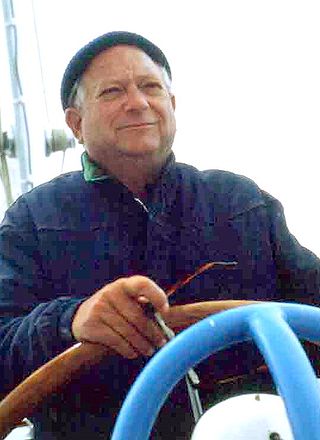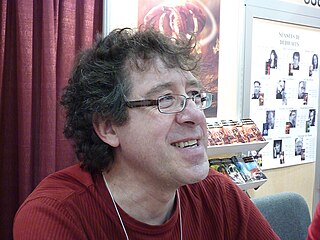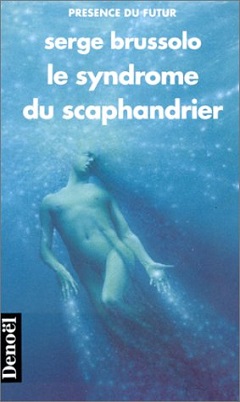
Serge Brussolo (born 31 May 1951) is a French fiction author.

Serge Brussolo (born 31 May 1951) is a French fiction author.
Born in Paris, Brussolo had a tormented childhood. He studied letters and psychology and wrote his first texts very early, finding inspiration in his misery and disturbed family environment. The blackness of his first novels set the tone for all of his future work.
At the beginning of his career, publishers rejected him because of his style – which, although close to fantasy and science fiction cannot easily be categorised under any genre. He persevered because he could not consider a future without writing. His work was first published in fanzines. His first published text was The Escaped Prisoner published in 1972 in The Wedged Paddle. This was followed by a great number of novels published in the Anticipation and Presence of the future series. Another of his works, Les semeurs d'abîmes, won the Prix Tour-Apollo Award in 1984.
His 1992 science fiction novel was translated into English in 2016 entitled The Deep Sea Diver's Syndrome .
Later he gave up science fiction in favour of other narrative forms, in particular the thriller and the historical novel. His first thriller, The Vermin, contained all of the ingredients of his later suspense novels. In his thrillers he denounces the problems of society, in particular that of the United States. To maintain his creative freedom Brussolo works with several publishers whom he puts in competition with one another, relying on the high sales figures his books achieve. He has also published under the pseudonyms Kitty Doom, D. Morlok, Akira Suzuko and Zeb Chillicothe.
In 2003, his novel A l'image du dragon [1] was freely adapted into an animated motion picture, The Rain Children , by Philippe Leclerc. In 2009, his best-selling novel Les Emmurés was adapted into an English-language film entitled Walled In .

Jules Gabriel Verne was a French novelist, poet, and playwright. His collaboration with the publisher Pierre-Jules Hetzel led to the creation of the Voyages extraordinaires, a series of bestselling adventure novels including Journey to the Center of the Earth (1864), Twenty Thousand Leagues Under the Seas (1870), and Around the World in Eighty Days (1872). His novels, always well documented, are generally set in the second half of the 19th century, taking into account the technological advances of the time.

John Holbrook Vance was an American mystery, fantasy, and science fiction writer. Though most of his work has been published under the name Jack Vance, he also wrote several mystery novels under pen names, including Ellery Queen.

Crime fiction, detective story, murder mystery, mystery novel, and police novel are terms used to describe narratives that centre on criminal acts and especially on the investigation, either by an amateur or a professional detective, of a crime, often a murder. It is usually distinguished from mainstream fiction and other genres such as historical fiction or science fiction, but the boundaries are indistinct. Crime fiction has several subgenres, including detective fiction, courtroom drama, hard-boiled fiction, and legal thrillers. Most crime drama focuses on crime investigation and does not feature the courtroom. Suspense and mystery are key elements that are nearly ubiquitous to the genre.
Frank Edward Peretti is a New York Times best-selling author of Christian fiction, whose novels primarily focus on the supernatural. As of 2012, his works have sold over 15 million copies worldwide. He has been described by the New York Times as creating the Christian thriller genre. Peretti is best known for his novels This Present Darkness (1986) and Piercing the Darkness (1989). Peretti has held ministry credentials with the Assemblies of God, and formerly played the banjo in a bluegrass band called Northern Cross. He now lives in Coeur d'Alene, Idaho with his wife, Barbara.
Keith John Kingston Roberts was an English science fiction author. He began publishing with two stories in the September 1964 issue of Science Fantasy magazine, "Anita" and "Escapism".
Fantastique is a French term for a literary and cinematic genre and mode that is characterized by the intrusion of supernatural elements into the realistic framework of a story, accompanied by uncertainty about their existence. The concept comes from the French literary and critical tradition, and is distinguished from the word "fantastic", which is associated with the broader term of fantasy in the English literary tradition. According to the literary theorist Tzvetan Todorov, the fantastique is distinguished from the marvellous by the hesitation it produces between the supernatural and the natural, the possible and the impossible, and sometimes between the logical and the illogical. The marvellous, on the other hand, appeals to the supernatural in which, once the presuppositions of a magical world have been accepted, things happen in an almost normal and familiar way. The genre emerged in the 18th century and knew a golden age in 19th century Europe, particularly in France and Germany.
Georges-Jean Arnaud was a French author.
A book series is a sequence of books having certain characteristics in common that are formally identified together as a group. Book series can be organized in different ways, such as written by the same author, or marketed as a group by their publisher.
Boileau-Narcejac is the pen name used by the French crime-writing duo of Pierre Boileau and Pierre Ayraud, also known as Thomas Narcejac. Their successful collaboration produced 43 novels, 100 short stories and 4 plays. They are credited with having helped to form an authentically French subgenre of crime fiction with the emphasis on local settings and mounting psychological suspense. They are noted for the ingenuity of their plots and the skillful evocation of the mood of disorientation and fear. Their works were adapted into numerous films, most notably, Les Diaboliques (1955), directed by Henri-Georges Clouzot, and Vertigo (1958), directed by Alfred Hitchcock.

The Hour of the Dragon, also known as Conan the Conqueror, is a fantasy novel by American writer Robert E. Howard featuring his sword and sorcery hero Conan the Cimmerian. It was one of the last Conan stories published before Howard's suicide, although not the last to be written. The novel was first published in serial form in the December 1935 through April 1936 issues of the pulp magazine Weird Tales. The first book edition was published by Gnome Press in hardcover in 1950. The Gnome Press edition retitled the story Conan the Conqueror, a title retained by all subsequent editions until 1977, when the original title was restored in an edition published by Berkley/Putnam. The Berkley edition also reverted the text to that of its original Weird Tales publication, discarding later edits. Later editions have generally followed Berkley and published under the original title.
Jean-Patrick Manchette was a French crime novelist credited with reinventing and reinvigorating the genre. He wrote ten short novels in the seventies and early eighties, and is widely recognized as the foremost French crime fiction author of that period. His stories are violent explorations of the human condition and French society. Manchette was politically to the left and his writing reflects this through his analysis of social positions and culture.

The literary genre of science fiction is diverse, and its exact definition remains a contested question among both scholars and devotees. This lack of consensus is reflected in debates about the genre's history, particularly over determining its exact origins. There are two broad camps of thought, one that identifies the genre's roots in early fantastical works such as the Sumerian Epic of Gilgamesh. A second approach argues that science fiction only became possible sometime between the 17th and early 19th centuries, following the scientific revolution and major discoveries in astronomy, physics, and mathematics.

Caza, the pseudonym of Philippe Cazaumayou, is a French comics artist.

Joël Champetier was a French-Canadian science fiction and fantasy author.

Karl Stig-Erland "Stieg" Larsson was a Swedish writer, journalist, and activist. He is best known for writing the Millennium trilogy of crime novels, which were published posthumously, starting in 2005, after he died of a sudden heart attack. The trilogy was adapted as three motion pictures in Sweden, and one in the U.S.. The publisher commissioned David Lagercrantz to expand the trilogy into a longer series, which has six novels as of September 2019. For much of his life, Larsson lived and worked in Stockholm. His journalistic work covered socialist politics and he acted as an independent researcher of right-wing extremism.
The grand prix de l'Imaginaire, until 1992 the grand prix de la science-fiction française, is a French literary award for speculative fiction, established in 1972 by the writer Jean-Pierre Fontana as part of the science fiction convention of Clermont-Ferrand.
The Rain Children is a 2003 French and South Korean animated fantasy film directed by Philippe Leclerc. The plot is loosely inspired by Serge Brussolo's novel A l'image du dragon.
French science fiction is a substantial genre of French literature. It remains an active and productive genre which has evolved in conjunction with anglophone science fiction and other French and international literature.

Jacques Aumont is a French academic and writer on film theory.

The Deep Sea Diver's Syndrome is a Science Fiction novel by Serge Brussolo, the first of over 150 novels by the French Author to be translated into English. It was originally published in 1992, and was later translated into English by Edward Gauvin and published in 2016. The surreal story follows David Sarella, a struggling dreamer in a world where dream "ectoplasms" have replaced art. The novel features surreal imagery and settings, frequent use of dramatic irony, and blatant commentary about art.
Roger Bozzetto and Arthur B. Evans, "The Surrealistic Science Fiction of Serge Brussolo." Science-Fiction Studies Vol. 24.3 (Nov. 1997): 430–440.